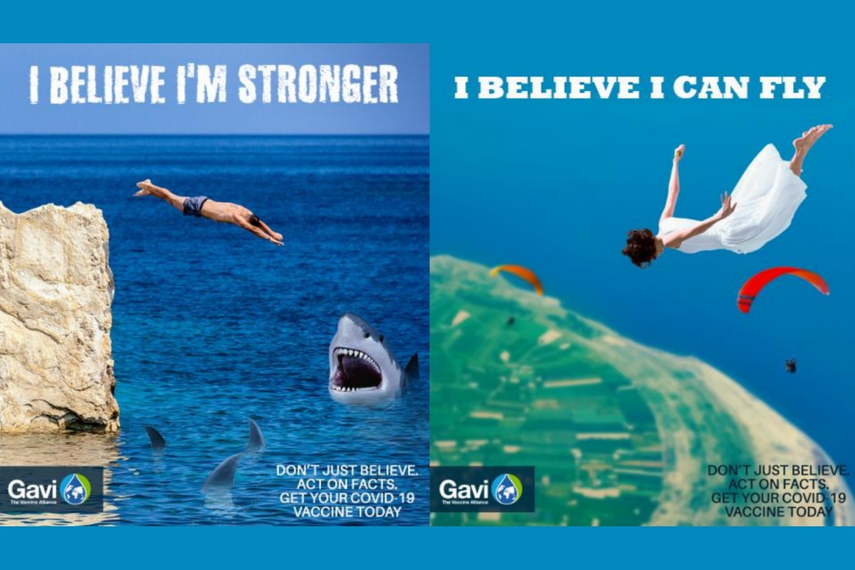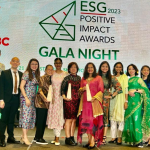A creative duo from Mindshare in Bangladesh won gold in the 2022 Young Spikes integrated competition with a proposal to overcome vaccine hesitancy.
With their concept for overcoming vaccine hesitancy through a combination of provocative messages about beliefs and behavioural incentives, a creative duo from Asiatic Mindshare in Bangladesh has won gold in the Young Spikes 2022 integrated competition. Shaikh Nafis Fuad, a copy supervisor, and Israt Anowar Tithi, senior executive in client servicing, topped a field of 20 teams in their first time entering the competition.
Their winning proposal for a vaccine-promotion programme was entitled, ‘Beliefs Can Be Deadly’. The annual Young Spikes competitions are aimed at creatives aged 30 or under, who work on a brief from a real client and present a 10-slide presentation outlining a proposal that uses at least three media channels and provides examples/visuals of campaign activation, along with a written submission.

The client in the competition, Gavi, the Vaccine Alliance, is a public-private global health partnership that works to increase access to immunisation in developing countries. The campaign objective was to change negative perceptions about Covid-19 vaccines and encourage vaccination.
A juror, Morihiko Hasebe, global executive creative director at Hakuhodo, called Fuad and Tithi’s campaign a great idea that would “help people positively face serious issues”. Another judge, Will Brockbank, GM for global marketing at Zespri International, said the proposal was “very clear, based on broad insight and will definitely force behaviour change”.
In an interview with Campaign Asia-Pacific, Fuad and Tithi discussed how they came up with the idea, what they learnt from the brief process, how the Young Spikes competition has helped their career development.

Fuad and Tithi first teamed up last year. When they received the brief, they started by going out to the streets to talk to random people about their attitudes toward vaccines. At the same time, they did peer research and asked their vaccine-hesitant colleagues and friends about their thoughts.
Based on this research and communication, they got lots of insights about the reality of vaccine hesitancy and crafted the creative idea, ‘Beliefs Can Be Deadly’. The core of the idea was to combat religious and cultural objections, as well as rumours and misinformation, by using scientifically proven facts, but packaged in a key message that “blind belief” can be deadly.
“The media does not promote how many people are getting well because of the vaccine, how many people are getting away with less suffering, just because of the vaccine,” Fuad said. Belief based on misconception and rumours is deadly, the proposed campaign argues: “Don’t listen to rumours. Act on the facts.”
In addition to the creative posters shown above, the campaign idea includes an outdoor activation. “In the middle of roads we were going to plan a booth where it will be written like ‘push to get a surprise’, and there will be a button,” Tithi said.
However, pushing the button would result in a loud noise or some other kind of shocking result, teaching the lesson that it’s not a good idea to act on random information you just happen to come across, followed up with positive information about the vaccines.

In addition, the creative duo believes that you need to know why people are not planning to take the vaccines and “make it easy” for them to change their mind, either with a behavioral incentive or simply by making it super easy to get vaccinated. The campaign idea also includes “organic proof” and an “incentive-based activity” to persuade people to go for their vaccines. The organic proof portion would involve inviting vaccinated people and doctors to share positive views of the vaccine through social media.
For the incentive portion, the duo suggested a government-supported programme that would offer free mobile talk time. In their research, Faud and Tithi had found that some vaccinated people actually went for their vaccines spontaneously, suggesting that even a small amount of talk time, worth 10 to 20 Bangladeshi taka (about US$0.12 to US$0.24) could be enough to get some lower- or middle-income people jabbed.
Fuad and Tithi worked on the brief alongside their day jobs. Fuad has over five years of experience in the creative industry, starting as a copywriter. Tithi began to work in 2018, but has only worked in the agency world for a year or so.
| Award | Entry title | Team |
| Gold | Beliefs Can Be Deadly | Shaikh Nafis Fuad, Israt Anowar Tithi |
| Silver | Trick or Truth | Hoang Kim Ngoc Bich, Tran Minh Quan |
| Bronze | Listen to Your Kids | Andra Miyanka, Nadita Putri Hapsari |
The pair also took part in Young Lions Bangladesh, and said the competitions have made them “incredible partners” and “a super team”. “Spikes taught an important lesson of market research,” Fuad said. Talking to people and getting real insights, rather than just reading information online, showed that “what people think actually is really different from what the media are feeding us”.
Tithi learnt that presentation is much more about the strength of an idea than the slides. “This competition gave us a lot more confidence,” she added. Though their winning campaign is just a proposal, the well-designed and well-presented brief has already changed the mind of at least one real person: A colleague who had not yet been vaccinated was convinced by the campaign ideas and went ahead to get jabbed.

This article was first published in Campaign Asia.
MARKETING Magazine is not responsible for the content of external sites.








